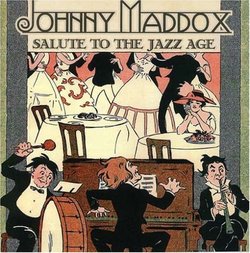| All Artists: Johnny Maddox Title: Salute to the Jazz Age Members Wishing: 0 Total Copies: 0 Label: Crazy Otto Music Original Release Date: 1/1/2007 Re-Release Date: 11/15/2006 Genres: Jazz, Pop Style: Number of Discs: 1 SwapaCD Credits: 1 UPC: 679791101328 |
Search - Johnny Maddox :: Salute to the Jazz Age
 | Johnny Maddox Salute to the Jazz Age Genres: Jazz, Pop
In the Nineteen Twenties, The Jazz Age, Americans were playing and listening to many kinds of music: folk songs, ragtime, the blues, gospel songs, jazz and Tin Pan Alley versions of them all. These sounds merged, submerged... more » |
Larger Image |
CD Details
Synopsis
Product Description
In the Nineteen Twenties, The Jazz Age, Americans were playing and listening to many kinds of music: folk songs, ragtime, the blues, gospel songs, jazz and Tin Pan Alley versions of them all. These sounds merged, submerged and re-emerged, especially in our cities, and the swirl of musical activity and creativity helped make The Twenties roar. On this unique recording, Johnny Maddox and Vern Baumer play it all. From their rousing opening with Sugar to the dazzling display of technical virtuosity in their mad dash to the finish at the end of Nobody s Sweetheart , they combine their talents in an infectiously spirited jam session. Johnny also plays solo many of the tunes he s discovered in his tireless search for new material from our musical past. To get yourself in the swing of this session, imagine you just dropped over for the afternoon, and Johnny and Vern decided to play a few tunes together unrehearsed and spontaneous, drawing on their common repertoire and years of experience. Vern calls one; Johnny calls one. And they go to it. Vern blows those fine, clear sounds from his clarinet and Johnny plays with the driving energy of his distinctive ragtime style. The sheer joy of making music together is what it s all about. Johnny and Vern salute The Jazz Age. SUGAR The first chorus of Sugar is all Johnny s. And then he sets up Vern s entrance in another key- a pleasant surprise for their opening number! Maceo Pinkard, composer of Sugar in 1926, also wrote the music for Sweet Georgia Brown , Gimmie A Little Kiss, Will Ya, Huh? and Them There Eyes . In 1922, with lyricist Nat Vincent, he wrote the tunes for Liza, an all-Black musical that seemed at the time a worthy successor to Noble Sissle and Eubie Blake s Shuffle Along (1921). Liza ran for twenty-one weeks and Pinkard s music received praise from the critics, but both show and score have long since been forgotten. VIRGINIA BLUES Fred Meinken, who also composed the Wabash Blues , helped make the Virginia Blues an endearing piece with his clever inclusion of the little strain from James Bland s Carry Me Back To Old Virginny (1878). Erdman s lyrics for the song run like this: I ve got those old Virginia Blues, the meanest kind of homesick blues . SAINT LOUIS BLUES Early on, there was not a clear distinction between rags and blues. W.C. Handy s first published blues, The Memphis Blues (1912), was in fact subtitled A Southern Rag . These first blues were generally more up-tempo than we ve come to expect, and it s fitting that Johnny plays so many of them this way in his ragtime style. The St. Louis Blues has three separate sections, making it also in this respect more like a rag. The middle section has an unusual tango rhythm and is in the minor key; and it also has sixteen measures instead of the usual twelve. Johnny uses this B section as the introduction for his duet with Vern. DO YOU KNOW WHAT IT MEANS TO MISS NEW ORLEANS? This and Johnny s Friday Night Stomp are the only tunes on this album which were written after the 1920 s. Do You Know What It Means To Miss New Orleans? was sung by Billie Holiday in her only feature film role, New Orleans, A United Artists production of 1947. The movie depicted the evolution of jazz, and featured such musicians as Woody Herman, Louis Armstrong and Kid Ory. This song is nostalgically reminiscent of those early days in jazz. In 1915, at the age of 13, composer Louis Alter began his own career playing piano for silent movies. In the 1920 s, he accompanied singers Nora Bayes, Irene Bordani, Helen Morgan and Beatrice Lillie. He later composed for Broadway musicals and for many other film scores....

 Track Listings (14) - Disc #1
Track Listings (14) - Disc #1